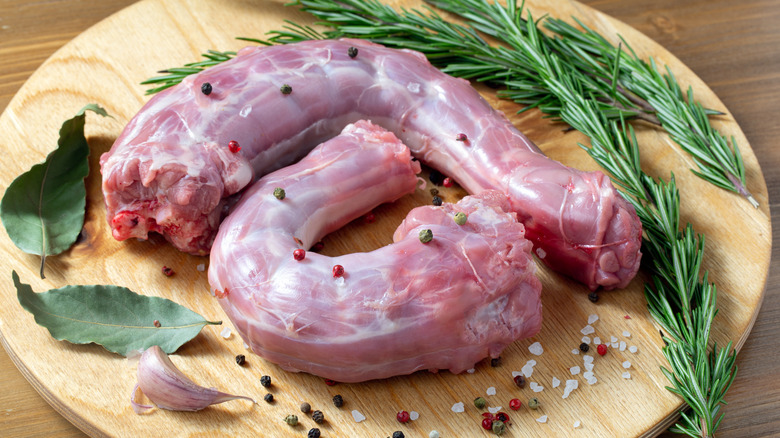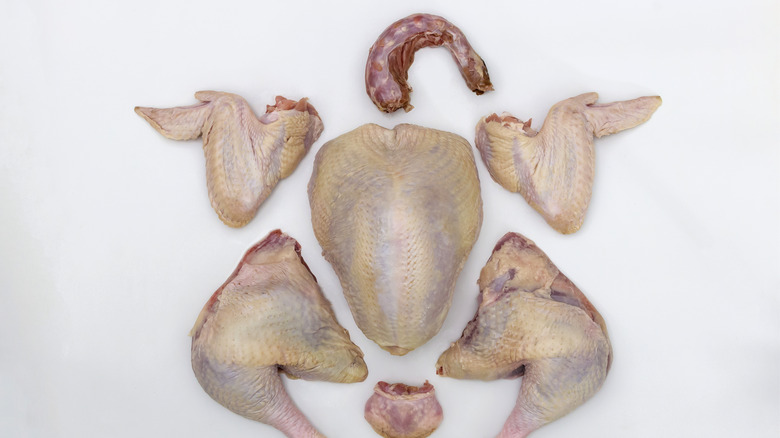Turkeys are big birds that yield a lot of meat, which is great for celebrations and large crowds. But theres more to a turkey than breast meat, thighs, and drumsticks — some of the most tender, succulent dark meat comes from the turkey neck, which you might be tossing away when preparing the bird to roast.
Turkey necks are an often overlooked and underrated gem in the world of poultry. While they might not be the first thing that comes to mind when you think of turkey, necks are a treasure trove of flavor. Packed with succulent meat and rich in collagen, they are perfect for making savory stocks, broths, and soups. The meat on turkey necks is also exceptionally tender, with a texture that practically falls off the bone when cooked properly. When simmered with aromatic vegetables and herbs, turkey necks release a deep, savory essence that can serve as the foundation for amazing gravies and sauces.
Turkey necks often get a bad rap deemed unappealing or undesirable by many. But don’t let their image fool you – these economical and versatile poultry pieces offer some great health benefits. If you can get over any preconceived notions about turkey necks you may just find they can be a nutritious and delicious addition to your diet.
What Are Turkey Necks?
Turkey necks are, quite simply, the neck of a turkey. More specifically, they are the cervical vertebrae of the bird with varying amounts of meat, skin, and fat left attached. Visually, turkey necks resemble a cross between chicken wings and pork neck bones. They feature sections of bone interspersed with some softer cartilage and meaty areas.
Turkey necks are often included in whole turkey or chicken purchases, or can be bought separately from butcher shops and grocery stores for a budget-friendly price. Their low cost makes them an ideal choice for adding flavor and nutrients to soups, stocks, stews, and other dishes.
Nutritional Profile – Why Turkey Necks Are Healthy
There are several nutritional benefits that make turkey necks a smart choice:
High in Protein – A 3 ounce serving of turkey neck provides around 17 grams of protein. This makes it an excellent source of protein for supporting muscle growth and repair, while helping you feel satiated.
Low in Fat – With only around 5 grams of fat per 3 ounce portion, turkey necks offer a lean protein option. This makes them perfect for those aiming to cut back on fat or calories.
Rich in Vitamins and Minerals – Turkey necks contain a range of B vitamins which are important for energy metabolism and nerve health. They also provide minerals like zinc selenium and iron which support immunity, thyroid function, and oxygen transport in the blood.
Source of Collagen – The connective tissues in turkey necks are rich in collagen, which supports skin elasticity, joint health, and injury recovery when consumed.
Helps Control Blood Sugar – The protein and collagen in turkey necks helps slow the absorption of sugars, preventing spikes and crashes in blood glucose. This makes them a smart choice for diabetics.
Promotes Satiety – The protein content keeps you feeling fuller longer, curbing cravings and overeating. This can support weight management goals.
So it’s clear that turkey necks can deliver some great nutritional benefits, packing protein, vitamins, minerals, and other nutrients in a low calorie package.
Potential Health Benefits of Turkey Necks
In addition to their stellar nutritional profile, regularly eating turkey necks may also provide some other health bonuses:
-
Supports Bone Health – The phosphorus and calcium content helps build strong bones and teeth.
-
Boosts Immunity – Zinc, selenium, and B vitamins in turkey necks support immune cell function for cold and flu defense.
-
Promotes Heart Health – Turkey necks provide monounsaturated fats that can improve cholesterol levels and lower heart disease risk.
-
Eases Joint Pain – The collagen in turkey necks may reduce inflammation and repair damage in joints and connective tissues.
-
Improves Skin, Hair, and Nails – Bioavailable collagen helps increase skin elasticity, hydration and may strengthen hair and nails.
While more research is needed, the nutrients and collagen in turkey necks show promise for targeting some of these common health complaints.
Delicious Ways to Cook Turkey Necks
Now that you know the health perks of turkey necks, you’re probably wondering how to actually prepare them. Here are some tasty ways to put this nutritious poultry to use:
-
Turkey Neck Soup – Simmer turkey necks and vegetables in broth for a protein-packed soup.
-
Hearty Turkey Stew – Brown turkey necks then slow cook with potatoes, carrots, peas and stock.
-
Savory Turkey Bone Broth – Roast turkey necks before simmering in water for a mineral rich broth.
-
Smoky Grilled Turkey Necks – Marinate and grill turkey necks for a protein-rich barbecue meal.
-
Spicy Turkey Tacos – Shred cooked turkey neck meat and serve in soft tortillas with salsa and veggies.
-
Turkey Neck Hash – Dice turkey necks along with potatoes, peppers and onions for a satisfying hash.
-
Turkey Neck Gravy – Use the drippings from roasted turkey necks to make a delicious gravy.
With some creativity in the kitchen you can transform economical turkey necks into everything from soups to stews, tacos, hashes, barbecue, gravy, and more.
Tips for Cooking and Serving Turkey Necks
To get the most out of your turkey necks, keep these preparation and cooking tips in mind:
-
Clean turkey necks thoroughly and pat dry before cooking. Trim off any excess fat or skin.
-
Turkey necks can be roasted, braised, boiled, instant potted, slow cooked or grilled. Adjust cooking times accordingly.
-
Use aromatic spices and herbs like garlic, onion, bay leaves, parsley, oregano, paprika, cumin, and chili powder to flavor.
-
Accompany turkey necks with vegetables, grains, beans or greens for a balanced meal.
-
For safety, cook turkey necks to an internal temperature of 165°F as measured by a food thermometer.
-
Once cooked, turkey neck meat can be shredded or chopped and added to soups, salads, tacos, casseroles and more.
Potential Drawbacks of Eating Turkey Necks
While they can be a healthy addition to your diet, turkey necks do come with a few cautions:
-
The high collagen content means they are quite tough and chewy unless thoroughly cooked. Proper cooking is essential.
-
Turkey necks can pose a choking risk for small children and seniors if not cut into small pieces. Supervise appropriately.
-
Those with food allergies or sensitivities should check with a doctor before consuming.
-
Overcooking turkey necks can make them dry. Keep moist by braising or stewing.
As long as you take care with preparation and cooking, turkey necks can offer an inexpensive way to add lots of flavor and nutrition to your meals.
The Verdict on Turkey Necks
While turkey necks might not be the most visually appealing poultry part, they deliver an impressive nutritional package at a budget-friendly price point. With some skillful seasoning and cooking, turkey necks can be transformed into nutritious, protein-rich additions to soups, stews, tacos, hashes, barbecue and more.
If you’re looking for an economical meat that offers protein, collagen, essential vitamins and minerals, turkey necks are definitely worth considering. Don’t knock them until you try them – your health and taste buds may just thank you.

How to cook turkey necks

To prepare turkey necks, start by giving them a thorough rinse and a gentle pat dry, ensuring theyre free from any surface impurities. While youre at it, check for any excess flaps of skin or fat, which can be easily trimmed before proceeding. You can slice the necks into smaller segments if youre serving them on the bone, or you can choose to cook them whole, as long as they fit into your pan.
Youll want to lightly season and brown the turkey necks by pan-searing them all around. This step not only enhances their taste but also contributes to the depth of the final dish. Once the necks are golden brown, immerse them in liquid for a slow, low braise, generously flavored with aromatics such as onions and bay leaves. Theyll need to simmer for about an hour; youll know theyre ready when the meat begins to easily flake off the bone. Whether youre cooking the necks to use the meat in another recipe or simply to eat as is, the cooking process is the same if you want them to yield tender, flavorful meat.
What is turkey neck meat?

Exactly as youd expect, turkey neck meat comes from the long tube-shaped neck of a turkey, and youll usually find it tucked inside the whole bird. Made of roughly equal parts meat and bone, it shares a culinary kinship with other bone-adjacent cuts like oxtail, short rib, and shank, boasting a deeper flavor than the white meat of turkey breasts and wings. Unlike those larger muscle groups, turkey neck meat consists of numerous small muscles — once cooked, it transforms into tender, juicy shreds that can be lifted from the bones, making it a versatile addition to a wide range of recipes.
Turkey neck can be used as a shredded addition to beans, soups, and sauteed greens, or served on the bone, smothered in richly flavored sauce. But the culinary magic doesnt end there: The simmering liquid used to cook the turkey neck meat becomes rich bone broth, brimming with nutrients. The broth can be then used for sauces, gravy, and soup with deep turkey essence.
TURKEY NECKS IN THE SOUTH
FAQ
Is turkey neck high in cholesterol?
Is there collagen in turkey necks?
Is turkey better for you than chicken?
What do turkey necks taste like to eat?
Is turkey neck meat good for You?
Much like other poultry, turkey neck meat is also a good source of protein and micronutrients. Turkey delivers a range of several B vitamins, including B3 (niacin), B6 (pyridoxine), and B12 (cobalamin), which are crucial for energy metabolism and the health of the nervous system.
What are the health benefits of ground turkey?
Ground turkey has multiple benefits. It is a good source of minerals, and B vitamins, rich in proteins, low in fat and it is lower in calories than common turkey.
What can I do if I have a turkey neck?
To improve your neck’s underlying muscle quality and tone, you can try: Turkey neck exercises: Daily neck exercises can strengthen neck muscles, which may help improve your neck’s appearance. For ideas on moves you can try, ask a dermatologist. Botox® for turkey neck: As the platysma muscles weaken, vertical bands or cords can appear on your neck.
What can you do with turkey neck meat?
Turkey neck can be used as a shredded addition to beans, soups, and sauteed greens, or served on the bone, smothered in richly flavored sauce. But the culinary magic doesn’t end there: The simmering liquid used to cook the turkey neck meat becomes rich bone broth, brimming with nutrients.
